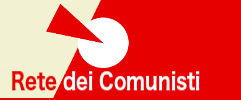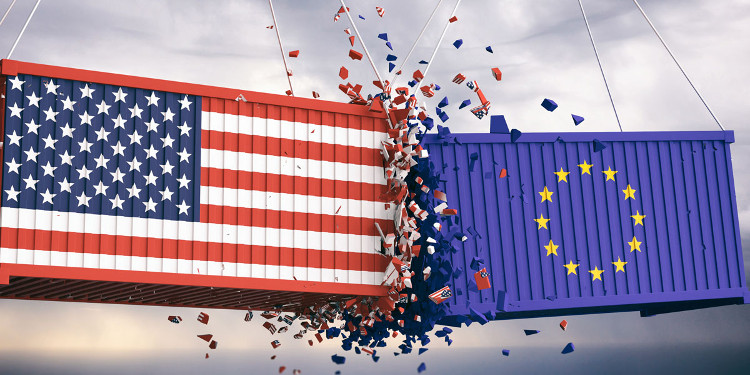| english | italiano |
«Protectionism is, in the best case, a worm that never stops turning»
(Friedrich Engels in“Protective tariff and free trade”)
After a considerable media storm that has been going on for months in the global information tourbillon, the first tariffs were imposed on Italy – by the USA – as part of the more general cycle of duties and various penalties against the countries of the European Union.
According to Bankitalia, these measures “will concern a relatively limited share of Italian exports towards the United States”, but whose “indirect effects could be significant”. For the experts of Bank of Italy, Italian exports would be affected for 400 million Euros, but the effects “transmitted through the exchange with our commercial partners in the area or through a possible revision of the business plans” should also be considered.
Mattarella’s visit to Washington was not enough to soften Trump’s position, who, in declaring that “he will take into consideration the grievances of his Italian friend”, added: “Europe has taken enormous advantage of the United States, but I can remedy this situation very easily”.
Immediately afterwards, the US President appealed to “allied reciprocity”, both in terms of trade and in terms of the relaunch of NATO, asking the guest to increase contributions to the Atlantic Alliance.
“Italy pays only 1% instead of 2% of its GDP to NATO, I hope it will increase spending”, said the head of the White House. This kind of ranting to underline that if some element of flexibility can be granted to the “Italian friends” on the side of the commercial war, then it will have to be compensated by an increase in military expenses and a renewed Atlantic loyalty.
Therefore, in the immanent dynamics of international capitalism, a measure returns –tariffs and their corollary of protectionist duties– which seemed to have been expelled from the current financial and economic debate typical of globalization and relegated to the status of an old tinsel of nineteenth-century economic literature.
On the contrary, to demonstrate that commercial tensions are now an acquired fact of the contemporary capitalistic (the inter-imperialistic competition), the International Monetary Fund, in recent weeks, hastened to cut the estimates of world GDP growth and consequently also the Italian ones that already showed ridiculous indices and forecasts.
In fact, on October 15th, at the opening of the annual meeting of the Monetary Fund and the World Bank (World Economic Outlook 2019), an alarming report was presented with a fairly clear and clear title: “Global manufacturing in decline, increasing trade barriers”, which photographs the increased tension between monetary areas, commercial powers and currency blocks and records a surge in the use, on a large scale, of the instrument of tariffs and of real protectionism.
It is clear that we are facing diplomatic and economic convulsions, well beyond our own Parmesan or Prosecco war, which allude both to a phase of further tension and, above all, to a progressive modification of the global economic hierarchies. All this within a political and geo-political context that presents a wide band of oscillation that alternates phases of agreement with periods of reciprocal threats and momentary truces with the same number of exhibition/extraction of final tones between the various competitors of this world challenge.
In this global dynamic – with the objective of framing the phase we are going through and the consequences that are produced in various ways in the various fields of social production and reproduction – the thinkingof the Rete deiComunisti finds place and, during the next Forum on October 26th in Rome,it will have an interesting moment of comparison and deepening between the Communists, the movements of independent struggle and those interested in discussing around these theoretical and practical junctions which are not placed, only, in the sky of theory but reverberate in society and in the general political agendas.
A discussion which, as a characteristic of the style of work of the Rete deiComunisti, has an immediate political and practical task!
Tariffs, currency wars, protectionist policies, economic, political and military competitions are acts and instruments of a time cycle (the duration of which we cannot predict) that we have defined as the “stalemate of Imperialisms”.
Those who know our theoretical elaboration know that – as Marxists – we are far from any theorization concerning improbable “periods of lasting peace on the global level”; on the contrary, the permanence of the course of the structural crisis of capitalism confirms the general tendency to “clash between powers” with good peace of mind of the ideological comic shops of those who saw a “world governance of capitalism”.
However, we cannot fail to note that – at the moment – even in the presence of an accumulation of all the contradictions typical of the capitalist mode of production (in its imperialistic maturity) – the relative rebalancing of forces, among the various imperialist marauders, highlights a condition that we have defined as “of stalemate”because a unipolar hegemony (of “old” or “new” type) does not clearly prevail yet, in the international scenario and in the various quadrants of crisis, all around.
But the “Tariffs, currencies and global competition. The stalemate of Imperialisms”Forum (http://lnx.retedeicomunisti.net/2019/10/15/tariffs-currencies-and-global-competition-the-stalemate-of-imperialisms) wants to be a confirmation that the strategic objective of the construction of the alternative of society is not a sterile petition of principle or an exhortation from the book of dreams but is a modern and current necessity.
Global competition, the currencieswar and the use of tariffs are – first of all – founding elements of the policies of attack on the living conditions of working humanity in a historical period in which every “progressive value of the globalization of markets” has exhausted, for a long time, all yearnings for progress and civilization.
A deep antisocial drift is advancing as the evidence of material and moral regression that this system is inducing in every latitude multiplies, with a growing and surprising speed, as dramatically demonstrated by the widespread and growing concern for a possible ecological infarction of the planet.
The re-launch of what we continue to call the struggle for Socialism and Communism remains for us the strategic objective of the reflection that we prospect and propose, and it forms the basis of our all-round militant action that we strive to outline and experience.

